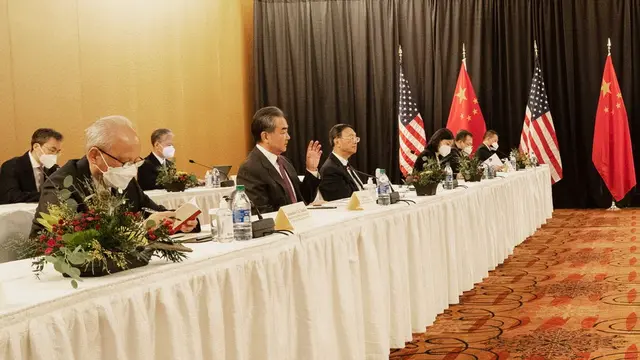**Editor's note: **Yawei Liu is the editor of U.S.-China Perception Monitor. The article reflects the author's opinions and not necessarily the views of CGTN.
In June 2020, there was a meeting between China's senior diplomat Yang Jiechi and then U.S. Secretary of State Mike Pompeo in Honolulu, Hawaii. The world only learned about that meeting after it was over, and we know that meeting did not go very well.
Not too long after the meeting, the Donald Trump administration began an unprecedented and coordinated assault on China with the American national security advisor, attorney general, FBI director and secretary of state all giving speeches in different cities in the U.S.
In his speech at the Richard Nixon Presidential Library, Pompeo declared, "We must induce China to change in more creative and assertive ways because Beijing's actions threaten our people and our prosperity."
Two days ago, there was another meeting between senior diplomats from China and the U.S. in another American city, Anchorage, Alaska. This time, not only did people on both sides of the Pacific know in advance the meeting was going to happen, but the entire extended opening exchange between Yang Jiechi, a member of the Political Bureau of the Communist Party of China (CPC) Central Committee and director of the Office of the Foreign Affairs Commission of the CPC Central Committee, and Chinese State Councilor and Foreign Minister Wang Yi on the China side and U.S. Secretary of State Antony Blinken and National Security Advisor Jake Sullivan on the U.S. side was broadcast online for the whole world to see.
The meeting highlighted China's position: It will not concede on any issues related to China's sovereignty, security and development interests. It does not intend to change its governance structure, and it objects to U.S. efforts to form an anti-China coalition. Both sides should know by now that any effort to seek policy change and behavioral revision of the other side on issues of their core interests will be futile, unwise and a complete waste of time.
It was unfortunate both sides chose not to wine and dine together, but it is comforting to see no side had walked out of the meeting. It is an indication that both Beijing and Washington know this relationship is too big to fail. The challenge now is to find realistic ways to avoid zero-sum rivalry, intentional conflict and unintended confrontation.
For China, the new framework of managing the volatile bilateral relationship was introduced by Foreign Minister Wang Yi back in July 2020 through three lists for cooperation, dialogue and crisis management. This initiative was completely ignored by the Trump administration.

A man walks on a street in Anchorage, Alaska, the United States, March 17, 2021. /Xinhua
Although the Joe Biden administration is still in the process of reviewing its predecessor's policies toward China, it appears to be at least partially responsive to the framework proposed by the China side. In his first foreign policy speech, Secretary Blinken described the management of the bilateral relationship, saying, "Our relationship with China will be competitive when it should be, collaborative when it can be, and adversarial when it must be.The common denominator is the need to engage China from a position of strength."
The U.S. is still in the process of moving itself into a position of strength through containing the pandemic, repairing its broken alliance, reducing domestic political polarization and recovering the economy. China does not think the U.S. is in a position of strength. At the same time, Washington appears to sees China as too aggressive toward its neighbors, too coercive against those nations that criticize it and too destructive toward the international order.
It is unfortunate that there was no joint statement from the Anchorage meeting. However, Chinese media reported that both sides had a constructive discussion on very concrete issues that will enable the two countries to quickly normalize their pre-pandemic travel and interaction.
This is a good step toward injecting positive energy into a relationship that has been in free fall for too long. What is even better is the scheduled online discussion between John Kerry, U.S. climate envoy and Xie Zhenhua, his Chinese counterpart.
I had a sinking feeling when watching the undiplomatic and hostile exchange at the beginning of the Anchorage meeting, but I was very encouraged by the small but positive steps taken by both sides during the closed-door sessions. I am hopeful the baby steps taken by the two sides will soon become bolder and more concrete measures to fix the relations.
If left unfixed, the two countries may soon be engulfed by conflict and confrontation that will send the Asia Pacific region and the world into disastrous turmoil. The world has already been dragged into a catastrophic recession. A zero-sum Sino-American rivalry will make global economic recovery impossible, destroy peace and prosperity in the Asia-Pacific region in the past four decades and threaten the happiness of both the Chinese and American people.
(CGTN)
 简体中文
简体中文












